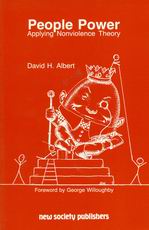
People Power
Applying Nonviolence Theory
Alpert, David H.
Publisher: New Society Publishers
Year Published: 1985
Pages: 62pp Price: $4.99 ISBN: 0-86571-049-X
Resource Type: Book
Cx Number: CX6483
Explores the theory of power on which all successful nonviolent action is based, the blocks which keep people from acting when confronted with injustice, and the roles played in any nonviolent campaign by allies, neutrals, and opponents. Numerous case histories illustrate the dynamics of nonviolent action.
Abstract:
During the latter half of the twentieth century, nonviolent protests became a cornerstone of several social movements across the world. From Ghandi in India to Martin Luther King Jr. in the United States, leaders put nonviolent theories into action and as a consequence, forever altered the course of history. David H. Albert's People Power: Applying Nonviolence Theory discusses how peaceful protests can be a powerful weapon of the people, if used and understood correctly. "The aim of this book is to provide activists with a tool to use in their ongoing struggles. It provides a framework for strategizing for social change - whether in the areas of disarmament, women's rights, worker control, environmental safety or whatever - from the perspective of basic nonviolence theory." The book addresses the problem that often protests start out peaceful and eventually turn violent when governments, companies or corporations do not instantly give in to their demands. Riots and civil unrest are usually brought about by the breakdown of the nonviolence theory, out of the sheer frustration of protesters. Albert's work breaks down the concept of nonviolent action and discusses the best methods that have lead to successful movements. The key to understanding the theory is understanding how power functions within society and how power can shift, be controlled and harnessed to initiate change, either for the better or worse. Albert describes how revolutions are "not made through military power, but by people power." People Power is an excellent starting point for activists researching nonviolent protest. The nonviolence theory asserts the idea that "ordinary people, you and I, are quite capable of engaging in nonviolent action in the defense of our lives, freedom, and humanity." Covering a wide range of topics and reviewing successful as well as unsuccessful movements, the book provides readers with a foundation on which to peacefully model their own social and political struggles.
[Abstract by William Stevenson]
Subject Headings


